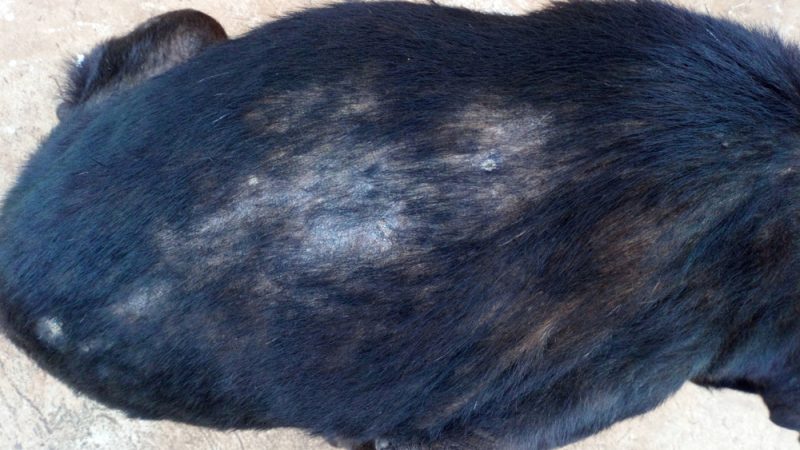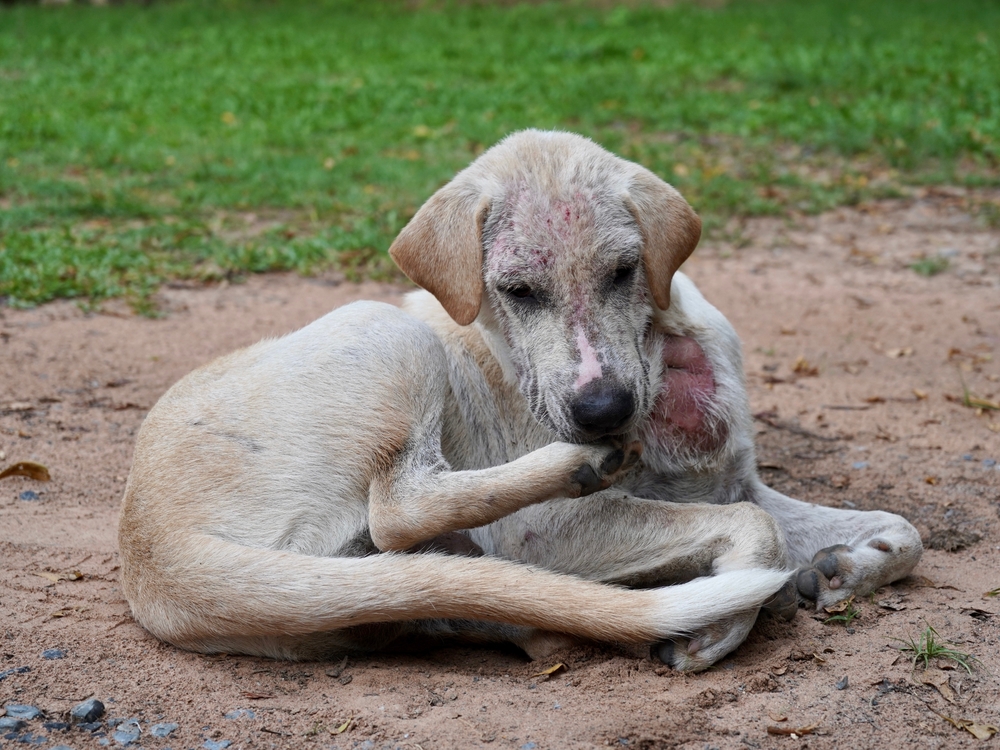Psoriasis affects more than 3% of adults in the United States, most commonly causing inflamed, red, and scaly patches of skin. If you or someone you know suffers from this skin condition, you may wonder if it is something that can affect your dog as well. So, can dogs get psoriasis?
While dogs suffer from a variety of skin issues that can cause similar signs, psoriasis is not currently a recognized disease in dogs. There is only one scientific report to date of a dog with a psoriasis-like skin condition.
Read on to find out more about what might be causing your dog’s itchy, inflamed, scaly skin.

What Is Psoriasis?
Psoriasis in people is an immune-mediated disease; the body’s immune system is triggered and overreacts as if there is something harmful attacking the body.1 Researchers are still investigating what triggers this immune response, which involves both genetics and external factors like bacterial infections.
There are several different forms, but psoriasis typically causes patches of dry, scaly skin, which are usually red, inflamed, and often sore or itchy. Some people with psoriasis will also develop psoriatic arthritis, causing joint pain, swelling, and stiffness.
Can Dogs Get Psoriasis?
While there is discussion in online articles about canine psoriasis, it has not been identified or recognized as a disease that affects our canine companions.
When looking into animal models for research into this complex condition, researchers have only been able to identify a few anecdotal reports of spontaneously occurring conditions with psoriasis features in other species,2 and only one formal report has been published on a dog diagnosed with a “psoriasis-like” condition.3
There is also a rare canine skin condition called psoriasiform lichenoid dermatitis,4 which shares some similar clinical and histological features of human psoriasis, but this has only been recognized in Springer Spaniels.



What Canine Skin Conditions Look Similar to Psoriasis?
So, what is more likely to be the cause of your canine’s itchy, red, flaky skin? Dogs are prone to several conditions that can look very similar to human psoriasis. Let’s have a look at some of the more common causes of these skin signs in dogs:
Allergies
Like us, our dogs can develop allergies to things like pollen and house dust mites, as well as to foods (typically animal-based proteins). In dogs, the most common sign associated with allergies is itchy skin, so affected dogs often suffer from red, inflamed skin, hair loss, and skin infections. Canine atopic dermatitis (atopy), which is typically associated with sensitization to environmental allergens, has a hereditary predisposition and is a particularly common skin disorder in dogs, affecting approximately 20%–30% of the canine population.
We recommend consulting a veterinarian if you have any questions or concerns about your pet’s health and wellness.
💛 🐶 Speak To a Vet Online From the Comfort of Your Couch!


If you need to speak with a vet but can’t get to one, head over to PangoVet. It’s an online service where you can talk to a vet online and get the personalized advice you need for your pet — all at an affordable price!
Parasites
Fleas are also a frequent cause of itchy skin in dogs. Some dogs suffer from flea allergic dermatitis and are allergic to components of flea saliva, leading them to have much more severe reactions to flea bites than other dogs.
Dogs can also be affected by various mites. Some live on the skin surface, such as cheyletiella mites, which are often known as “walking dandruff” due to the scaly scurf visible in the coat. Others burrow into the skin like sarcoptes mites (causing very itchy sarcoptic mange) and demodex mites. Both of these can cause patches of hair loss, thickened and often inflamed skin, and sometimes increased scale.


Skin Infections
Bacterial skin infections (pyoderma) often cause crusts, dry or flaky patches of skin, and itching that may look similar to psoriasis. Yeast dermatitis caused by Malassezia pachydermatis is also a frequent cause of itching, thickened skin, crusts, and scales.
Although less common in dogs, ringworm (dermatophytosis) is a fungal skin infection that can also present with scaly patches of hair loss.
Seborrhoea
Seborrhoea is the term used to describe ongoing scaly skin conditions caused by an issue in the normal cycle of skin cells being made and shed. This process is affected by other medical issues, such as skin allergies and infections. However, some dogs will have an inherited condition that affects how skin cells are made and replaced. This is more common in certain breeds, such as Cocker Spaniels, West Highland White Terriers, and Basset Hounds. Signs usually start earlier in life.



Can You Use Human Psoriasis Medications on Dogs?
Never give or apply a medication prescribed for you to your dog. In the case of some psoriasis creams, this could even be life-threatening.
Vitamin D analogs, such as calcipotriene, are commonly found in topical creams to treat psoriasis in humans. Brand names include Taclonex and Dovonex. Dogs have a low threshold of toxicity if they ingest any of these products. They cause an increase in blood calcium levels, leading to gastrointestinal upset, increased thirst and urination, and, in severe cases, kidney failure, seizures, and heart issues.
Contact your vet or the Pet Poison helpline immediately if your dog has ingested any amount of psoriasis cream.

Final Thoughts
Psoriasis is a common, long-term skin condition that affects people. It is a complex immune-mediated disease that appears to have a genetic basis. To date, psoriasis is not recognized as a disease in dogs, but dogs can suffer from several skin conditions that present with signs that can appear very similar to psoriasis, particularly allergies.
If your dog is itching or has patches of red, flaky skin, get them to your vet for diagnosis and treatment. Never use any human medications that have not been prescribed for them.
Featured Image Credit: February_Love, Shutterstock